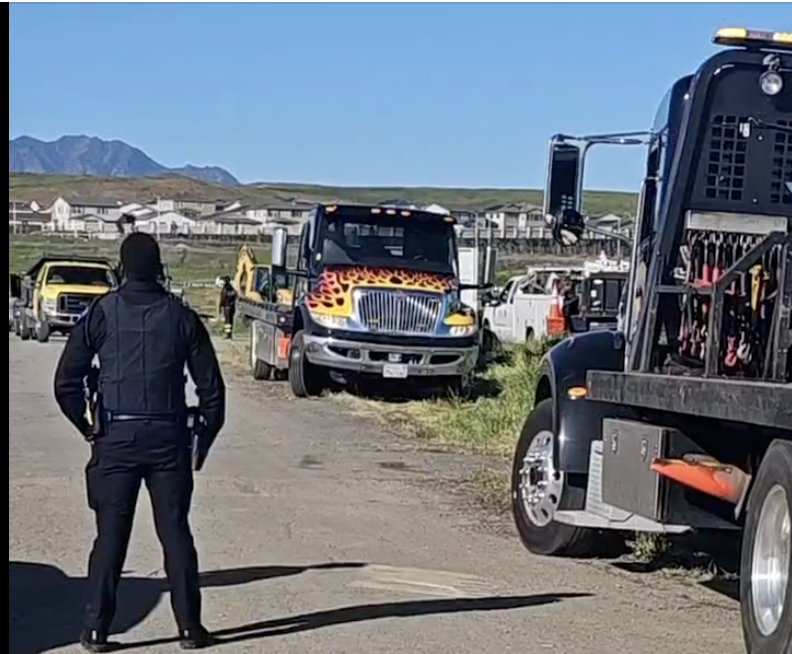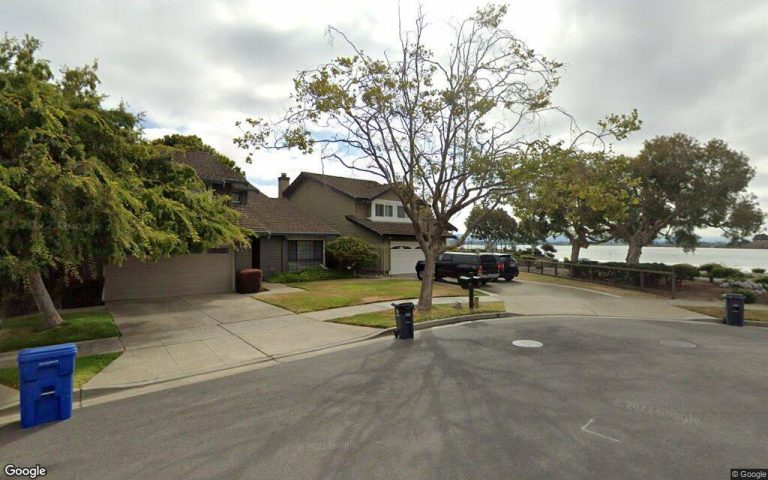Almost three weeks after dismantling a large homeless encampment along Wilbur Avenue, the city of Antioch evicted another encampment of trailers and recreational vehicles farther east along Highway 4.
Monday’s sweep affected an area between the highway and Neroly and Laurel roads. Though city officials did not return emails, those on scene observed at least six vehicles, including some working trucks that were being towed away on Monday morning. The Wilbur Avenue cleanup on March 19, meanwhile, included the towing of some 70 vehicles, according to the city.
Early Monday morning, Harry Bouchard came to the Neroly and Laurel roads encampment along with others to help people pull out vehicles that had become stuck in mud after a rain storm. Bouchard, who had been homeless for years, is now living in shared housing and wanted to help out his friends. He was there five days earlier when police warned the encampment it was being shut down and was told it was an environmental issue due to a creek being nearby.
“I get that,” he said in a phone interview on Tuesday. “If you have vehicles, some are going to drip oil someplace — most were campers — but if you have vehicles down there where it’s a waterway, that oil sits in the ground, goes to the water and goes to the bay.”
But after helping pull the vehicles out, Bouchard said he found himself caught in the fray as police confiscated his truck and towed it away while he stood watching in disbelief. Bouchard said despite an advance warning, most of the vehicle owners at the encampment had no way of moving out until the land dried up.
Bouchard estimated about nine or 10 campers or recreational vehicles and nine cars and a motorcycle at the site, several of which had come from the previous Wilbur Avenue encampment.
“It’s not fair,” he said, worried about a family he knows who uses their car to take kids to and from school. “We got everyone up and ready to roll out of here and they wouldn’t let us leave.”
Homeless advocate Nichole Gardner, obviously distressed by the situation, came to the site that day as soon as she found out.
Gardner said no one notified her Facing Homelessness in Antioch nonprofit, but she received a message via Facebook from a couple that had been evicted and had nowhere to go, so she rushed down to the encampment to see what was going on.
Gardner didn’t get far as police would not let her or anyone else into the scene by the time she arrived. All exits were blocked. Another man who had come to help get the vehicle out also had his truck towed, she said.
“I can only imagine trying to grab everything you can while they are towing your only vehicle,” she said.
Gardner said she was most upset, though, that no one from Contra Costa County’s CORE Homeless Outreach program nor the Angelo Quinto Mental Crisis Response Team was on scene. As far as she knew, no one had been notified, she said.
“Why do we have 15 officers out here wasting resources when we’re lacking officers?” Gardner said. “That just doesn’t even make sense when there’s no crimes being committed here. Where are the people to help these folks out? They need to be here.”
City staff or officials did not return messages requesting answers or comment.
Gardner later said as she was preparing to leave a CORE member showed up – about an hour and a half into the sweep – and said he had not been notified.
“I just don’t understand why they didn’t let them drive their vehicles off,” she added.
The advocate said more than 20 persons were displaced in the sweep, and many just stood by the large open field not knowing what to do next, some walking off with bags and their pets. Code enforcement officials put the belongings they confiscate on a 30-day hold, but most people do not return to retrieve them, Gardner said.
Bouchard said he couldn’t afford the hundreds of dollars to retrieve his towed truck, which was behind on registration fees, and he didn’t know what he was going to do. He said tow cost was $290 plus $85 a day for storage.
Gardner, meanwhile, continues to advocate for some kind of safe parking place for the unhoused, which she thinks could help.
“They don’t want them (the unhoused) in one place or in a field where they’re away from everybody, but then they scatter around the city and then it’s always gonna be a problem,” she said. “It’s just sad, really sad.”
Check back for updates.












